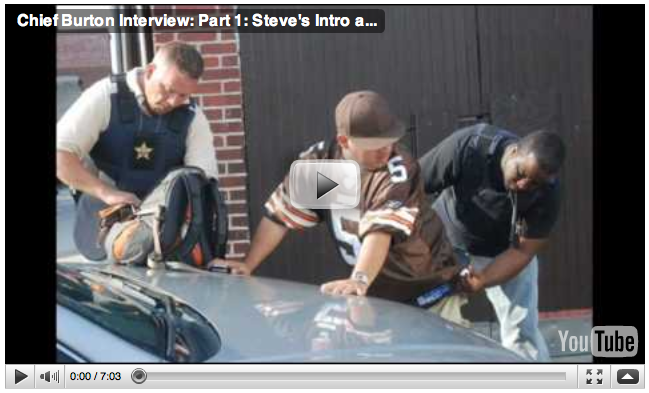Search and Seizure
Federal Appeals Court Rejects Warrantless GPS Tracking

Awesome Police Chief Works to Educate Citizens About Their Rights
Here's Columbia, MO Police Chief Ken Burton talking about how he uses the new Flex Your Rights video, 10 Rules for Dealing with Police, to teach people about their rights during police encounters:

How to Get Arrested for Marijuana in One Easy Step
[image:1 align:right caption:true]If you'd like to get arrested for marijuana, just tell a police officer that you have some in your car:
The officer pulled Vento over at entrance 13 to Interstate 95. While talking to Vento, he appeared nervous, according to police. When asked why, Vento said he had been arrested in the past on drug charges, police said. The officer then asked if there was anything illegal in the car. Vento said he had a marijuana blunt.
Upon searching the car, police found two more blunts. All three tested positive for marijuana. Police also found a bag with a small amount of marijuana.
Vento posted a $250 bond and was released with a Monday, July 26, court date. [Darien Times]
As you can see, the police don't "go easier on you" just because you made things easier for them. If you admit to a crime, you'll be arrested for it. The constitution protects you against self-incrimination and unreasonable searches, so don't confess and never give police permission to search you or your belongings.
If you need more info on your rights during police encounters, watch 10 Rules for Dealing with Police. Then watch it again.
10 Rules for Dealing with Police Film Premiere & Webcast
The Washington, DC premiere and live webcast that was cancelled on Feb. 12 has been rescheduled! Flex Your Rights invites you to attend... 10 Rules for Dealing with Police FILM PREMIERE! Cato Institute with comments from If you can make it, please register now. Seating is limited. If you can't make it to DC, that's okay. You can visit this page to watch the live event. If you haven't done so yet, pre-order your 10 Rules DVD today for only $15.00. Orders will ship by March 23. (Check out the sexy 2-minute video preview.) Sincerely,
|
Press Release: U.S. Supreme Court Declares Strip Search Of 13-Year-Old Student Unconstitutional
Press Release -- NYCLU to School District: Mass Student Search Illegal, Humiliating & Invasive
CONTACT: Jennifer Carnig, 212.607.3363 / [email protected]
NYCLU to School District: Mass Student Search Illegal, Humiliating & Invasive
FOR IMMEDIATE RELEASE
May 28, 2009 â The New York Civil Liberties Union has called on the Red Creek Central School District in upstate New York to publicly apologize to high school students subjected to illegal, humiliating and invasive searches by state police and school officials.
In a letter to Superintendent David Sholes, the NYCLU also urged the district to take steps to prevent invasive searches and protect studentsâ rights. Students subjected to the April 9 searches were passengers on a school bus parked outside of Red Creek High School. Every student was pulled off the bus and searched.
âThis was one of the most humiliating moments of my life,â said 18-year-old graduating senior Stephanie Schultz, who is attending college in the fall. âMy school taught me about the Constitution and about my rights, and then pushed them both aside and made me feel like my rights didnât matter.â
Schultz and at least 17 other students on a Williamson BOCES school bus were removed from the bus in mixed gender pairs and ordered to the Red Creek High School principalâs office by a uniformed state trooper. In the principalâs office, the students, male and female, were subjected to invasive searches in full view of each other.
Schultz was searched by a female librarian in front of three males â her principal, a police officer and a classmate. Though she asked that she be searched in a room without men, her request was denied. She cried as she was forced to roll down her waistband and expose part of her underwear and buttocks.
âThe principal walked out because I was crying so much,â Schultz said. âI knew it wasnât right what was happening, but there was nothing I could to. I felt helpless and humiliated.â
Nothing was found on the culinary arts student. In fact, the school district did not have suspicion that any of the students searched were engaged in any illegal activity at that time.
âStudents must not be stripped of their rights and their dignity at the schoolhouse door,â NYCLU Executive Director Donna Lieberman said. âWhile drug abuse is a serious matter, it can be addressed without public humiliation. These students are now afraid of their teachers, they are afraid of the police, and they are afraid of what their classmates think of them. They deserve a public apology to ease these fears and restore their reputations.â
The male students were searched by Principal Noel Patterson as a state trooper watched. Female students were searched just a few feet away by a female school employee. Each student was ordered to remove their jacket, shoes and socks, and empty their pockets. Some students were âpatted down,â others were asked to lift shirts and undershirts, and one student was asked to remove an outer pair of pants.
âThis was humiliating, embarrassing, frustrating and a waste of my time,â said 18-year-old graduating senior and honor roll student Stephanie Forsythe. âEveryone saw me escorted by the police and thought I was arrested. I shouldnât have had to go through that and I donât want this to happen to my little siblings.â
According to the district, each student was subjected to a âwaistband search,â which in some cases entailed turning down the waistband to reveal parts of their underwear, buttocks and pelvic area, in view of male and female school staff and the male state trooper. Backpacks, purses and other containers were also searched. At least one student was charged criminally and suspended for a year.
The NYCLU maintains that the searches violated the studentsâ rights under both the U.S. and New York State constitutions. The April 9 searches of the BOCES students were not based on individualized suspicion that any particular student was engaged in illegal behavior at the time of the search. Moreover, even if the school district had adequate ground for a search, the search that was conducted was far more intrusive and humiliating than is constitutionally permissible.
âEducators should know better than to do this to kids,â said Tim Cosser, whose 17-year-old son was searched. âI know they have to keep schools safe, but I donât understand this. Itâs not right. The district needs new guidelines that protect studentsâ rights.â
In light of the constitutional violations that occurred on April 9, the NYCLU urges the district to take the following steps:
·        Issue a public apology making clear to the community that the vast majority of the students on the bus were guilty of no wrongdoing and acknowledging the illegality of the searches.
·        Revise its policy on student searches to state that no reasonable search may be conducted without individualized suspicion of wrongdoing. Individualized suspicion must be based on facts known to the official about the particular student that support a belief that a search will uncover evidence of a crime or violation.
·        Clarify and enhance its memorandum of understanding with the New York State Police with the goal of with the goal of creating clear guidelines for police and school officials that protects student rights.
·        Provide all school district employees who may be involved in student searches and interrogations annual training on studentsâ rights.
The district covers the towns of Butler and Wolcott in Wayne County and the village of Fair Haven and parts of Victory, Sterling and Conquest in Cayuga County.
To read the NYCLUâs full letter, visit http://www.nyclu.org/node/2411.
-xxx-Important 4th Amendment Supreme Court Victory
Dear Friends: Today, the Supreme Court handed down a great ruling in Arizona v. Gant, which increases 4th Amendment protection against warrantless vehicle searches. We've been following the case for a while, and this outcome is exciting. Please visit our blog for FYR Associate Director Scott Morgan's analysis on the decision's likely impact. Sincerely,                                                                                                                    Â
Steve Silverman P.S. Flex Your Rights is the only organization focused solely on defending the 4th Amendment and teaching citizens to understand their rights during police encounters. If you support our efforts, please consider making a one-time tax-deductible donation today. As you know, we can't do this important work without your support. © 2009 Flex Your Rights Privacy Policy If you choose to unsubscribe from the mailing list, click here. |
Senior Citizens Caught in the War on Drugs -- DrugSense FOCUS Alert #367
Constitutional Challenge of Canada's Medical Cannabis Program
Pagination
- First page
- Previous page
- …
- 16
- 17
- 18
- 19
- 20
- …
- Next page
- Last page





